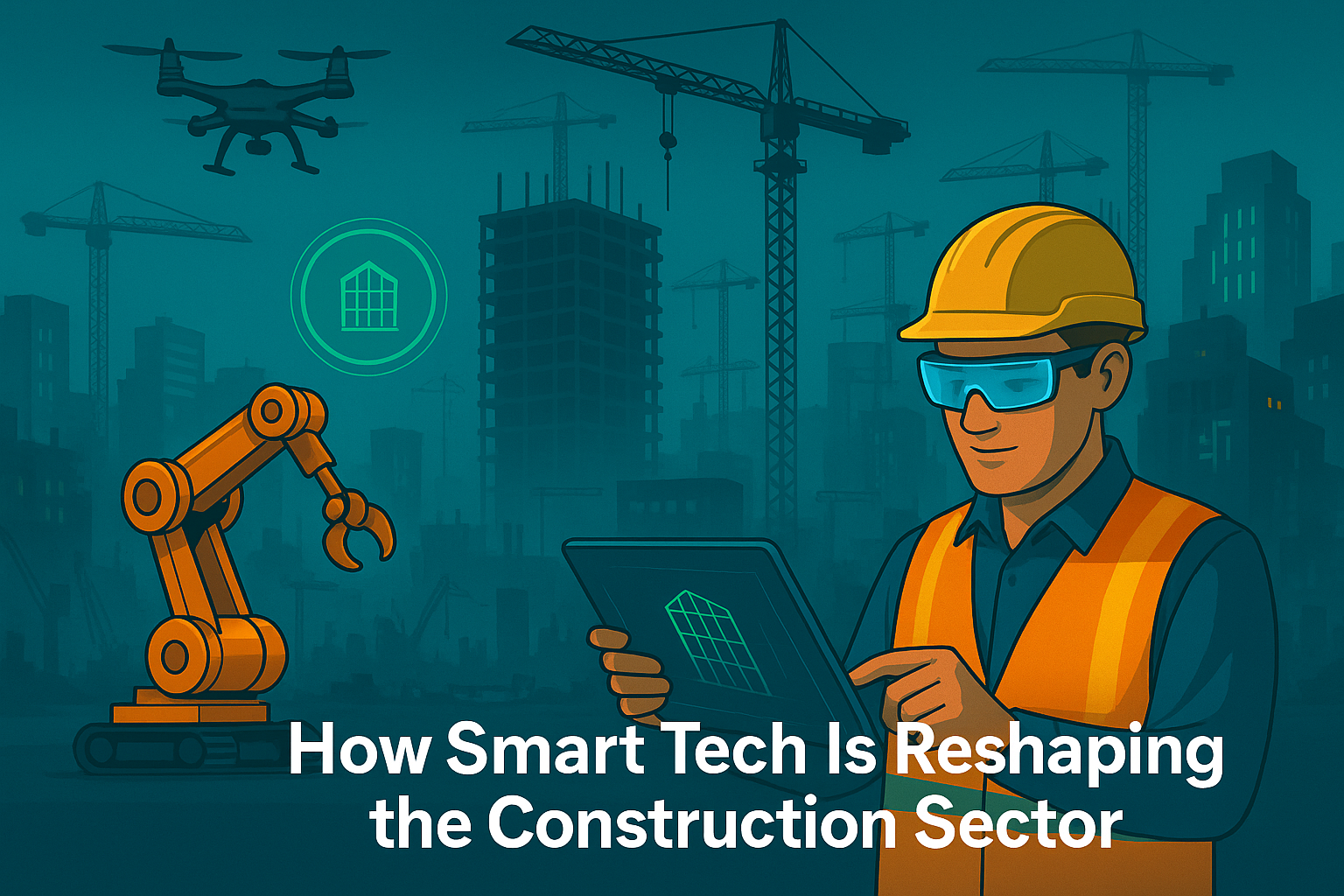Construction sites right now look noisy and messy while constantly staying delayed. During that period, people accepted this manner of work as standard practice. The construction process during that time period included various uncertainties linked to delay, as well as mistakes and cost increases.
But things are changing fast. Smart technology implementations have transformed construction sites into new, modern operations. The imaging work of drones, combined with robotic machinery and Artificial Intelligence, enables team members to work both swiftly and astutely.
People can witness technological advances in construction development at Gujarat Conex events. Construction technology arrives today to transform the building sector into its best form yet.
The Digital Transformation of Construction
Contemporary industrial development calls for technology-based methods, as traditional analysis and progress have been replaced. The $4.5 trillion construction industry that will exist in 2030 will require quicker and safer construction methods, as well as operational enhancements, to support its growth on this scale.
Construction digital transformation incorporates the use of artificial intelligence (AI), Building Information Modelling (BIM), the Internet of Things (Iot), drone technology, robotics, and augmented reality (AR) technologies into its operations. These technology solutions enable businesses to increase operational efficiency and reduce mistakes as they endeavour to create sustainable, smart buildings.
According to Forbes, design with BIM on the cloud supports faster construction. These obstacles to common operations are all removed by the ongoing advancement of technology.
Key Smart Technologies Impacting Construction
Let’s explore further the main smart technologies impacting the sector:
1. Building Information Modelling (BIM)
A digital format known as BIM presents the physical and functional nature of building facilities. Real-time architectural, engineering and construction team collaboration allowed by BIM technology enables visualisation of possible problems so users can avoid extra expenses and construction delays.
2. Artificial Intelligence and Machine Learning
Predictive analytics impact how projects are managed via artificial intelligence. Teams can use AI to calculate risks, analyse schedules, and deliver projects on time with actual data in the moment. At the same cost, teams can make better-driven decisions faster with AI generating predictive responses, employing machine learning algorithms on the enormous datasets to make a reasonable assessment of things like potential project delays or where to allocate resources.
3. Internet of Things (IoT)
Iot connects networks of devices to the internet – including equipment, tools, and systems – in real-time to access data about project performance. Smart sensors enable the monitoring of structural integrity, tracking workers’ safety, and the efficient use of power, improving project efficiency and on-site operational safety.
4. Drones
Project sites must be monitored through drone operations for site surveys, while inspections and ongoing project checks regularly use drones for monitoring progress. Project managers receive instantaneous high-resolution data and images from drones, while these platforms decrease work duration and, along with regulated expenses.
5. Robotics and Automation
Robots are taking care of repetitive and hazardous tasks, such as bricklaying, welding, and now even road building. Automation may enhance accuracy in many project tasks and mitigate the physical workload for workers.
6. Augmented Reality (AR) and Virtual Reality (VR)
Architecture, along with engineering, has experienced significant changes through the implementation of AR and VR systems during the visualisation stages. Teams use virtual technology to experience what it’s like walking through new buildings before any construction begins, thus detecting design issues beforehand.
The Gujarat Conex events let businesses actively examine how they can implement smart solutions in their operational processes to achieve enhanced results.
Embracing Smart Technologies: KDCL Global’s Approach
KDCL Global demonstrates to the construction industry how companies can strategically use modern technology to boost operational efficiency alongside innovative developments.
KDCL Global integrates BIM technology into their project design phase, together with IoT site solutions, which facilitates organisational communication channels and delivers better site safety standards while maximising resource efficiency. Drone surveys generate immediate project information, which enables managers to base their decisions on quantitative data.
KDCL Global uses AI for project management in construction scheduling, which shortens project periods by 20%, resulting in substantial savings and higher client satisfaction rates.
Thus, their strategy demonstrates how active technology deployment remains a crucial principle that platform visitors at Gujarat Conex learn from.
Benefits of Smart Construction Technologies
Smart technologies bring practical advantages that significantly impact the construction cycle at every stage of development.
1. Increased Efficiency
The combination of automation and artificial intelligence substantially shortens the time needed to execute repetitive operations. Through digital channels, departments can communicate without delays which result from communication misunderstandings.
2. Enhanced Safety
Live monitoring conducted through wearable technology and IoT sensors tracks worker health together with environmental conditions to minimise workplace incidents while speeding up emergency actions.
3. Cost Reduction
The combination of predictive maintenance with IoT, risk mitigation with AI, and waste reduction using BIM helps decrease construction expenses and boosts project profitability.
4. Higher Quality Projects
Smart tools create enhanced precision in construction operations, resulting in improved building quality through a reduced number of defects. The entire construction project lifecycle includes quality assurance measures in each phase of development, from design to execution.
5. Sustainability
Smart tech facilitates greener construction practices. Building Information Modelling optimises energy-efficient designs through its optimisation power, and IoT systems track resource consumption to reduce environmental effects.
Challenges and Considerations
Implementing smart construction technologies requires handling several difficulties despite delivering major advantages to the industry:
1. High Initial Investment
Future technology solutions require substantial initial funding, which poses difficulties for entrepreneurial companies. Checking the Return On Investment over time shows that the investment cost is eventually justified.
2. Skills Gap
The implementation of new technologies depends on workers who possess skills in using digital devices, artificial intelligence, and data science. Organisations need to spend money training their employees alongside developing their skills to overcome these gaps.
3. Data Security Concerns
Data security becomes essential because connected systems continue to process larger shares of data. Protecting sensitive data, including project information and client details, requires the highest priority.
4. Resistance to Change
Traditional practices dominate the working methods of the construction industry. Technical change implementation requires both strong leadership and a well-defined vision to overcome internal employee resistance to new methods.
5. Integration Complexity
Implementing several new technologies simultaneously can cause difficulties when integrating them. Effective management of this complexity becomes possible by selecting compatible system components and implementing gradual rollouts.
All companies agree that smart technology will drive future developments in the industry, as those who fail to adopt change will fall behind their competitors.
Conclusion
The building and construction industries are entering a digital revolution, which brings smart technologies to accelerate building construction and develop safer, more sustainable, and efficient construction processes. AI-based project management systems and drone technology are leading tools that assist site surveys, challenging current possibilities in construction development.
The leading company KDCL Global demonstrates strategic technology adoption, which yields exceptional results. Regardless of encouraging industry events like Gujarat Conex to learn, network and investigate technologies in this industry, the smart journey to the future will need to consider some bumps along the way. While the industry evolves through technology disruption, the construction industry is finally now on its path to a smart future, one brick or one byte at a time, for those who are ready to change their ways.
FAQs
1. How is smart technology changing construction project management?
Smart technologies, like AI and BI, enable more thoughtful planning, faster decision-making, real-time collaboration, and ultimately reduced delays and project efficiencies.
2. What do drones do for construction?
They are used for site surveys, inspections, progress reviews and generating high-resolution aerial data, as well as for safety and accuracy in these functions.
3. Why is Building Information Modelling (BIM) an important part of construction?
BIM provides teams an opportunity to discover, plan and simulate a complete project digitally before construction occurs and identify clashes or concerns in the area during pre-construction times, which ultimately saves time and costs of wrong assumptions.
4. What are the biggest challenges when implementing smart construction technologies?
Some of the biggest challenges that many construction companies will face when adopting new and innovative smart construction technologies include the high up-front costs, the lack of skilled, qualified labour, the risks of cyber attack, and, more often than not, an unparalleled resistance to change.




Leave a Reply